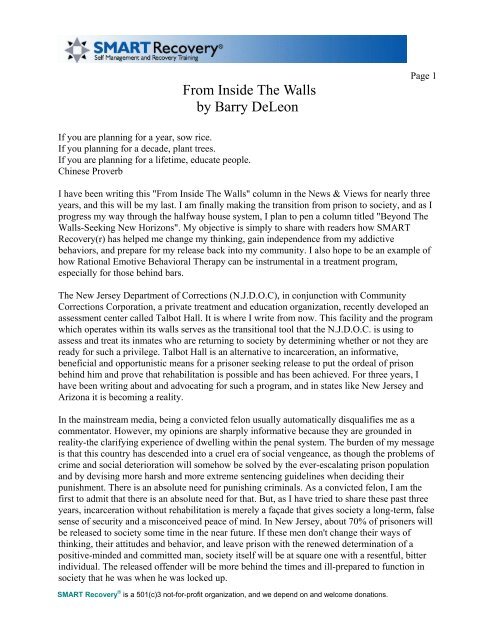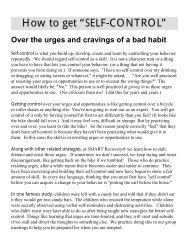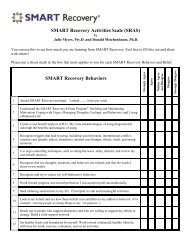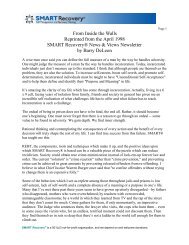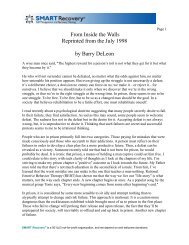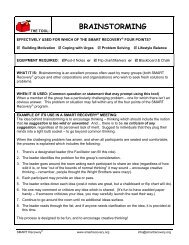From Inside The Walls by Barry DeLeon - SMART Recovery
From Inside The Walls by Barry DeLeon - SMART Recovery
From Inside The Walls by Barry DeLeon - SMART Recovery
You also want an ePaper? Increase the reach of your titles
YUMPU automatically turns print PDFs into web optimized ePapers that Google loves.
<strong>From</strong> <strong>Inside</strong> <strong>The</strong> <strong>Walls</strong><strong>by</strong> <strong>Barry</strong> <strong>DeLeon</strong>Page 1If you are planning for a year, sow rice.If you planning for a decade, plant trees.If you are planning for a lifetime, educate people.Chinese ProverbI have been writing this "<strong>From</strong> <strong>Inside</strong> <strong>The</strong> <strong>Walls</strong>" column in the News & Views for nearly threeyears, and this will be my last. I am finally making the transition from prison to society, and as Iprogress my way through the halfway house system, I plan to pen a column titled "Beyond <strong>The</strong><strong>Walls</strong>-Seeking New Horizons". My objective is simply to share with readers how <strong>SMART</strong><strong>Recovery</strong>(r) has helped me change my thinking, gain independence from my addictivebehaviors, and prepare for my release back into my community. I also hope to be an example ofhow Rational Emotive Behavioral <strong>The</strong>rapy can be instrumental in a treatment program,especially for those behind bars.<strong>The</strong> New Jersey Department of Corrections (N.J.D.O.C), in conjunction with CommunityCorrections Corporation, a private treatment and education organization, recently developed anassessment center called Talbot Hall. It is where I write from now. This facility and the programwhich operates within its walls serves as the transitional tool that the N.J.D.O.C. is using toassess and treat its inmates who are returning to society <strong>by</strong> determining whether or not they areready for such a privilege. Talbot Hall is an alternative to incarceration, an informative,beneficial and opportunistic means for a prisoner seeking release to put the ordeal of prisonbehind him and prove that rehabilitation is possible and has been achieved. For three years, Ihave been writing about and advocating for such a program, and in states like New Jersey andArizona it is becoming a reality.In the mainstream media, being a convicted felon usually automatically disqualifies me as acommentator. However, my opinions are sharply informative because they are grounded inreality-the clarifying experience of dwelling within the penal system. <strong>The</strong> burden of my messageis that this country has descended into a cruel era of social vengeance, as though the problems ofcrime and social deterioration will somehow be solved <strong>by</strong> the ever-escalating prison populationand <strong>by</strong> devising more harsh and more extreme sentencing guidelines when deciding theirpunishment. <strong>The</strong>re is an absolute need for punishing criminals. As a convicted felon, I am thefirst to admit that there is an absolute need for that. But, as I have tried to share these past threeyears, incarceration without rehabilitation is merely a façade that gives society a long-term, falsesense of security and a misconceived peace of mind. In New Jersey, about 70% of prisoners willbe released to society some time in the near future. If these men don't change their ways ofthinking, their attitudes and behavior, and leave prison with the renewed determination of apositive-minded and committed man, society itself will be at square one with a resentful, bitterindividual. <strong>The</strong> released offender will be more behind the times and ill-prepared to function insociety that he was when he was locked up.<strong>SMART</strong> <strong>Recovery</strong> ® is a 501(c)3 not-for-profit organization, and we depend on and welcome donations.
Page 2Thus, he will likely revert to drug use and/or crime and re-offend. He loses again-but so doessociety. Prison costs continue to escalate. A taxpayer falls out of the tax base, and the countrycontinues to be burdened with the families left fatherless and husbandless. This is all preventablefor a large population of prisoners with the right treatment.Changing one's attitude and thought process leads to rational thinking and meaning and purposein life. As the saying goes, "You are today where your thoughts have brought you; you will betomorrow where your thoughts take you." This is so applicable towards every person capable ofthought, and this simple concept must be conveyed to every man and woman leaving prison.<strong>The</strong>y need to be shown how to look at their lives differently, as well as society with its laws.Anais Nin said that, "We don't see things as they are; we see things as we are." Changing theway we think will change who we are; and if that change is positive, we will get positive resultsto our actions.I've been expressing this point, this ideology, for some time now, and I am extremely pleased tosee treatment becoming a focal point of New Jersey's D.O.C. I am very grateful to participate inthe N.J.D.O.C.'s assessment and treatment program. It is essential to the successful acclimationof oneself back into the community. This program envelops <strong>SMART</strong> <strong>Recovery</strong>'s(r) concepts, aswell as other self-help direction and instruction <strong>by</strong> a staff who is well-trained and committed toproviding resident inmates, ready to rejoin society, with the necessary tools we need to avoidbecoming another statistic. <strong>The</strong> revolving door can really stop here. REBT, Cognitive ThinkingSkills, Life Skills, and <strong>SMART</strong> <strong>Recovery</strong>(r) taught in an environment and schedule that isstructured, predictable and positive will give us the practical experience of living an organizedlife. That is what Talbot Hall is about, and I applaud Commissioner Jack Terhune, C.C.C. andthe NJDOC for providing this opportunity to the prisoners of New Jersey. I suspect that if we canimplement this same conceptual program into the prisons themselves, we can even better prepareprisoners for acclimation into the halfway house program and transition into society. <strong>The</strong> publicmust be shown that rehabilitation should be every bit the focus as punishment is. We must allseek new horizons.Editor's Note: We are pleased that <strong>Barry</strong> will be transitioning from prison to society! We lookforward to sharing his "Beyond the <strong>Walls</strong>" column in future issues, and we hope that <strong>Barry</strong>Grant, another talented inmate who writes columns, will continue to share his "Behind the<strong>Walls</strong>" perspectives until his transition occurs. Readers who wish to write to <strong>Barry</strong> <strong>DeLeon</strong> maynow do so <strong>by</strong> contacting him at the following address: <strong>Barry</strong> <strong>DeLeon</strong>, 289753, Talbot Hall, 100-140 Lincoln Highway, Kearny, NJ 07032.<strong>SMART</strong> <strong>Recovery</strong> ® is a 501(c)3 not-for-profit organization, and we depend on and welcome donations.


